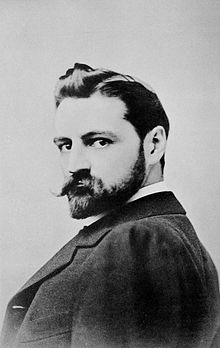Sergei Mikhailovich Volkonsky
Sergei Mikhailovich Volkonsky , Prince ( Russian Сергей Михайлович Волконский , scientific. Transliteration Sergei Michajlovič Volkonskij * May 4. . Jul / 16th May 1860 greg. On lock case , Keila-Joa , Estonia ; † 25. October 1937 in Hot Springs , USA ) was a Russian music and theater educator .
Life
He was a member of the Rurikid princes Volkonsky . As the son of Mikhail Sergeyevich Volkonsky , who was born in Siberia , he always saw himself ideologically as the successor to his grandmother Maria Volkonskaya and his grandfather Sergei Grigoryevich Volkonsky , a Decembrist who accepted the exile to Siberia for his ideals . He described himself as a theater man and is only one of the large family of Russian talents of the oldest nobility and that name.
From July 22, 1899 until the end of the 1901 season, he was director of the imperial theaters in Saint Petersburg and Moscow and then worked intensively as a teacher for actors. He paid particular attention to gestures and rhythmic movement (Dalcroze) in order to form a new type of actor. That is why he founded a “Rhythmic Gymnastics Course” in Saint Petersburg and was in close contact with the protagonists of European dance education in Hellerau near Dresden and Geneva .
He worked as a speaker, author, critic, had to hide during the civil war of 1917/18 and reappeared in Moscow in 1919 to familiarize a new generation of actors with his “art of lively speech” at the studios for Proletkult sponsored by Lunacharsky . To this end, he also gave lectures at the “Small Theater”, was a member of its advisory board as well as that of the Bolshoi Theater , where, under its director Jelena Malinovskaya , he was significantly involved in the training plans for ballet work.
Sick of typhus in 1919 , he had to spend two days in custody (Cheka) - barely recovered - and escaped death by being shot. He then went to Petersburg to teach facial expressions, to give lectures on the Decembrists - and then to emigrate in 1921. From 1926 he worked in Paris as director of the Russian Conservatory and promoter of many talents who had to leave their Russian homeland (including Marina Tsvetaeva ). He also worked in London after living in Florence and Rome for a while.
His reputation has been remarkable in the United States since his lecture tour of the States in 1896. Anticipating the coming developments after the fascists came to power in Germany, he married the widowed daughter of the late US Ambassador for Serbia, Greece and Romania JW Fairn Mary Fairn-French and traveled one last time, this time to the USA, ostensibly for the daughter to visit his wife from his first marriage. His memoirs (English My reminescences ; Russian Moi wospominanija ) he wrote in the years 1921 to 1924, he also published a number of articles on work in the theater.
Works
- The Decembrists . G. Löffler, Riga 1926
- Poslednij den . Mednyj Vsadnik, Berlin 1924
- Pictures from the history and literature of Russia . Authorized translation by A. Hippius published by Friedrich Emil Perthes, Gotha 1898 (by the translator dedicated to Her Royal Highness the Grand Duchess of Baden), St. 318 pp.
- The main thing . Article on gesture in: Die Schaubühne , weekly for the entire interests of the theater; Volume IV, Dec. 29, No. 52, Erich Reiss Verlag Berlin, 1910
literature
- Sergei Volkonsky: Lost Homeland . Köhlerbuch, epubli GmbH 2015, ISBN 978-3-7375-6852-4
Web links
- Literature by and about Sergei Michailowitsch Wolkonski in the catalog of the German National Library
- Biography , Tambov Oblast Universal Scientific Library
| personal data | |
|---|---|
| SURNAME | Volkonsky, Sergei Mikhailovich |
| ALTERNATIVE NAMES | Волконский, Сергей Михайлович (Russian); Volkonskij, Sergej Michajlovič (scientific transliteration) |
| BRIEF DESCRIPTION | Estonian music and theater teacher |
| DATE OF BIRTH | May 16, 1860 |
| PLACE OF BIRTH | Castle Fall, Keila-Joa , Estonia |
| DATE OF DEATH | October 25, 1937 |
| Place of death | Hot Springs , Virginia |
